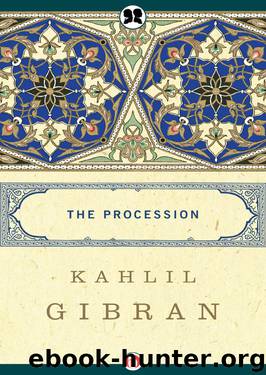The Procession by Kahlil Gibran

Author:Kahlil Gibran [Gibran, Kahlil]
Language: eng
Format: epub
Publisher: Philosophical Library/Open Road
Published: 0101-01-01T00:00:00+00:00
The Procession Of Gibran
In 1919 Gibran surprised his friends by issuing at his own expense, a beautiful and artistic book containing “The Procession”—his hidden masterpiece of Arabic poetry. The paper, the type, illustrations and binding all bespoke the tender regard and care that Gibran had bestowed upon this unique child.
The Arabic is a forceful language with a prolific vocabulary of pregnant words of fine shadings. Its delicate tones of warmth and color form with its melodies a symphony, the sound of which moves its listeners to tears or ecstasy. Anyone present at an Arabian gathering where prose or poetry is recited may readily note how the heads and then the bodies of the listeners commence to sway in rhythmic accompaniment to the recitation. In “The Procession” we often find Gibran carried away by the charm of the lyric and oblivious to the strict continuity in the Kasida.
Nassib ’Arida, the gifted Arabian poet, wrote the introduction to “The Procession” and explained how the dual discourse came about:
“An old sage, worldly-wise and ripened by experience, had left the city to wander in the countryside, and wearily rested himself at the edge of the forest; a naked, sun-bronzed youth emerged from the forest, reed in hand, to throw himself in abandon beside the sage, and the two unceremoniously commenced their discourse.”
The sage pours forth his wisdom in measured logic and a tinge of disappointment while the rebellious youth bursts out with his expressions of the Universality of the Whole.
To this translator, the poem represents the unconscious autobiography of Gibran: Gibran the sage, mellowed beyond his years, and Gibran the rebel, who had come to believe in the Unity and Universality of all existence and who longed for simple, impersonal freedom, merged in harmony with all things.
I feel that it does not behoove one to venture into a critical study of the poem but rather to permit each reader to quaff according to his own cup—his intellectual and emotional capacity. For Gibran himself, a master of both the pen and brush, finds these mediums inadequate: at the end of each refrain he takes refuge in the non-dimensional, limitless medium—the plaint of the reed—or spiritual essence.
Those who read Gibran’s life and knew of his yearning for the peace of Wadi-Quadisha and Mar-Sarkis can now read the philosophy of the rebellious child of nature in the following:
Download
This site does not store any files on its server. We only index and link to content provided by other sites. Please contact the content providers to delete copyright contents if any and email us, we'll remove relevant links or contents immediately.
| Ancient, Classical & Medieval | Anthologies |
| British & Irish | Japanese & Haiku |
| Love Poems | Regional & Cultural |
| Themes & Styles | United States |
| Women Authors |
The Universe of Us by Lang Leav(15076)
The Sun and Her Flowers by Rupi Kaur(14517)
Adultolescence by Gabbie Hanna(8927)
Whiskey Words & a Shovel II by r.h. Sin(8018)
Love Her Wild by Atticus(7757)
Smoke & Mirrors by Michael Faudet(6191)
Wiseguy by Nicholas Pileggi(5784)
The Princess Saves Herself in This One by Amanda Lovelace(4975)
Love & Misadventure by Lang Leav(4846)
Memories by Lang Leav(4800)
Milk and Honey by Rupi Kaur(4748)
Bluets by Maggie Nelson(4556)
Too Much and Not the Mood by Durga Chew-Bose(4348)
Pillow Thoughts by Courtney Peppernell(4284)
Good morning to Goodnight by Eleni Kaur(4233)
The Poetry of Pablo Neruda by Pablo Neruda(4106)
Algedonic by r.h. Sin(4063)
HER II by Pierre Alex Jeanty(3611)
Stuff I've Been Feeling Lately by Alicia Cook(3458)
